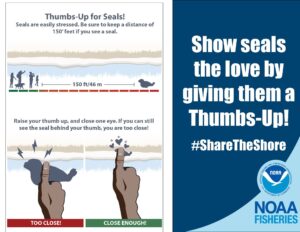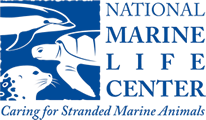What You Can Do for a Stranded Marine Animal
Thank you for caring about sick and injured marine animals, and for wanting to help! Please remember that wildlife can be dangerous and carry diseases. Additionally, animals can be very stressed by human presence. Be sure to stay away from the animal, keep other people, dogs, and seagulls away, and report the animal to the proper authorities.
Here are some species-specific tips for marine animal strandings in Massachusetts.
Please note that the National Marine Life Center is authorized as a hospital to provide rehabilitative care to sick and injured seals and sea turtles; we are not authorized to provide beach response and we work with those authorized organizations to bring animals from the beach or from another organization to our facility as needed. In the United States, rescue, rehabilitation, release, and research involving marine animals is governed by various federal agencies including NOAA and the US Fish and Wildlife Service, and often by state agencies as well.
The following information is specific to the state of Massachusetts
Marine Mammals (seals, dolphins)
1. Do not touch, pick up, or feed the animal. Do not return the animal to the water. Seals often temporarily “haul out” on land to rest. Seal mothers often briefly leave their pups on shore while they go out to sea to fish. A beached dolphin or whale should be reported immediately.
2. Observe the animal from a distance of at least 150ft/46m. If the animal notices you, you’re too close. Keep other people, dogs, and seagulls away from the animal.

3. Note the animal’s physical characteristics such as size and coloration. This helps responders determine the species and what resources may be needed. Take photos if possible, remembering to stay at least 150 feet away.
4. Note the animal’s condition. Is it weak? Thin? Are there any open wounds?
5. Note whether or not the animal has any obvious identification tags or markings.
6. Determine the exact location of the animal for accurate directions. Responders can’t rescue an animal if they can’t find it!
7. Call an authorized marine mammal stranding network facility with as much information as you have. If leaving a message, be sure to include very specific directions as well as your name and phone number so they can call you back if they have questions.
- In Massachusetts from Plymouth south to Rhode Island, including Cape Cod, please call the International Fund for Animal Welfare (IFAW)’s hotline at (508) 743-9548.
- In Massachusetts on Martha’s Vineyard and Nantucket, please call the National Oceanographic and Atmospheric Administration Northeast Region (NOAA)’s hotline at 866-755-NOAA (6622).
- Outside of Massachusetts, please visit the NOAA Stranding Networks web page to find your authorized beach response agency, or call your local police department.
Sea Turtles (cold-stunned, Massachusetts)
1. Don’t put the turtle back in the water. Sea turtles that come ashore in Massachusetts need medical attention.
2. Don’t remove the turtle from the beach. Special permits and training are required to work with these endangered animals.
3. Move the turtle above the high tide line if you can do so safely.
4. Cover the turtle with dry seaweed to help it from getting even colder.
5. Mark the turtle’s location with a stick, buoy, or other piece of beach debris so rescue volunteers can find it.
6. Call an authorized sea turtle stranding network facility with as much information as you have. If leaving a message, be sure to include very specific directions as well as your name and phone number so they can call you back if they have questions.
- In Massachusetts from Plymouth south to Rhode Island, including Cape Cod, please call the MassAudubon Wellfleet Bay Wildlife Sanctuary‘s hotline at (508) 349-2615.
- In Massachusetts from Plymouth north to New Hampshire, as well as on Nantucket and Martha’s Vineyard, please call the New England Aquarium‘s hotline at (617) 973-5247.
- Outside of Massachusetts, please visit the NOAA Sea Turtle Stranding and Salvage Network web page to find your authorized beach response agency, or call your local police department.
Entangled Marine Animals At Sea (Whales, Sea Turtles)
1. Report the entanglement sighting immediately. Don’t wait until you get back to land.
2. Do NOT touch the animal or the entangled gear. It is not safe for the animal or people involved. It’s also illegal to handle the animals without a permit.
3. Maintain a safe distance from the animal in trouble.
4. Record the time and coordinates of the animal’s location.
5. Be alert for trailing lines which may foul props.
6. Be prepared to stand by until responders arrive, if possible.
7. Note the appearance and size of the animal and the type of entangling gear.
8. If at all possible, photograph or video the sighting from a safe distance.
9. Call the the NOAA Marine Animal Entanglement Hotline at 1-800-900-3622 or 866-755-NOAA or hail the U.S. Coast Guard on VHF Channel 16.
- The Provincetown Center for Coastal Studies‘ entanglement response team is on-call and committed to providing safe and effective disentanglement of marine animals in the waters off Massachusetts, Rhode Island, and New Hampshire.
- Elsewhere, NOAA or the Coast Guard will direct your report to the authorized agency.
Other Wildlife (Sea Birds, Land Mammals, Other Reptiles, etc.)
1. Call an authorized wildlife rehabilitator. Only people who are licensed rehabilitators or veterinarians may legally treat wildlife.
- On Cape Cod, call the Cape Wildlife Center in Barnstable at (508) 362-0111 or WildCare Cape Cod in Eastham at (508) 240-2255.
- On the South Coast, call the New England Wildlife Center in South Weymouth at (781) 682-4878.
- Elsewhere in Massachusetts, visit the MassWildlife webpage for an authorized list of rehabilitators.
- Otherwise, contact your state wildlife agency for an authorized list of rehabilitators.
2. Follow instructions from the authorized rehabilitator. Depending on the situation, they may want you to leave the animal where it is, put it back, move it, or bring it in to their center.
3. Many young animals are not abandoned! Their mothers leave them in hiding for the youngster’s safety. Young animals are often best served by leaving it where you found it. As MassWildlife says, “If you care, leave them there!”
